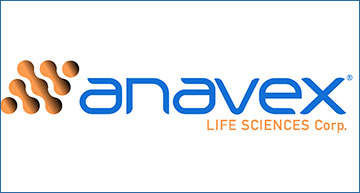- Expression levels of pathological dysregulated neurodegenerative genes of both Alzheimer’s and Parkinson’s disease were significantly restored by the therapeutic effect of ANAVEX®2-73 (p<0.005)
- These findings will facilitate contextualization of upcoming readout of ANAVEX®2-73 Phase 2b/3 Alzheimer’s disease clinical trial
Anavex Life Sciences, a clinical-stage biopharmaceutical company developing differentiated therapeutics for the treatment of neurodegenerative and neurodevelopmental disorders including Alzheimer’s disease, Parkinson’s disease, Rett syndrome and other central nervous system (CNS) diseases, today announced the first entire clinical gene pathway data from the ANAVEX®2-73-PDD-001 Parkinson’s Disease Dementia (PDD) study at the Alzheimer’s Association International Conference (AAIC), taking place in San Diego, CA and virtually on July 31 – August 4, 2022.
The poster presentation titled, “Study of the mechanism of action of Blarcamesine (ANAVEX®2-73): Whole blood transcriptomics analysis (RNAseq) identifies treatment impact on compensatory pathways by restoring key neurodegenerative pathways functionality, including Alzheimer’s and Parkinson’s disease pathways” is being presented by the principal author, Dr. Mohammad Afshar, MD, PhD, Ariana Pharma, Paris, France and Cambridge, US.
Randomized, placebo-controlled clinical trial in 132 patients with Parkinson’s disease dementia (PDD) included prespecified biomarkers of response as well as Whole Exome Sequencing DNA data and full RNA exome expression data collection.
ANAVEX®2-73 transcriptomics analysis (RNAseq) identified a gene network that is differentially expressed in Parkinson’s disease dementia (PDD) patients treated with ANAVEX®2-73 compared to placebo after 14 weeks of treatment. The expression of 14,150 genes were analyzed from both placebo and ANAVEX®2-73 treated patients. Biological relevance of this gene network was assessed through pathway analysis and confirmed the impact of ANAVEX®2-73 treatment on pathways involved in neurodegenerative diseases, especially Alzheimer’s disease and Parkinson’s disease.
While genes are known to be down-regulated in Alzheimer’s disease1 and Parkinson’s disease2, representing pathology for these diseases, ANAVEX®2-73 singularly impacted expression levels of these genes in multiple pathways by countering the pathological down-regulation of genes in both Alzheimer’s (p<0.005) and Parkinson’s disease (p<0.005) and other degenerative diseases (p<0.005).
The scope of these detected gene expressions identified through ANAVEX®2-73 effect may represent additional potential biomarkers of disease pathology and response.
Previously, this study demonstrated dose-dependent, statistically significant improvement of dementia assessment, Quality of Episodic Memory with ANAVEX®2-73 (p=0.003) as well as significant improvement of Parkinson’s assessment, MDS-UPDRS Total score (p=0.034), in patients treated with ANAVEX®2-73 high oral dose once daily during the 14-week trial. SIGMAR1 mRNA expression significantly increased in ANAVEX®2-73-treated patients vs placebo (p=0.035) over the course of treatment and was significantly associated with improvements of MDS-UPDRS scores and cognitive efficacy endpoints CDR system.3
Dr. Jaime Kulisevsky, MD, PhD, Principal Investigator of the trial, commented, “To my knowledge, this represents the first extensive transcriptomics analysis (RNAseq) of a therapeutic agent in patients with Parkinson’s disease dementia (PDD). It is very intriguing to confirm this robust correlation of the clinical improvements of motor impairment (MDS-UPDRS) and cognition (CDR system) with compensation of expression levels of dysregulated neurodegenerative genes, especially Alzheimer’s disease and Parkinson’s disease, through the therapeutic effect of ANAVEX®2-73. PDD is a debilitating disorder with significant co-morbidities and there has not been a mechanistically novel medication approved for PDD in over 20 years. Hence, new therapies are urgently needed to alleviate this suffering and disability.”
Christopher U Missling, PhD, President & Chief Executive Officer of Anavex, stated, “It is exciting to witness ANAVEX®2-73’s (blarcamesine) demonstration of its platform Precision Medicine potential for both Alzheimer’s disease and Parkinson’s disease, and likely other neurodegenerative diseases. We believe these results will facilitate contextualization of upcoming readout of ANAVEX®2-73 Phase 2b/3 Alzheimer’s disease clinical trial and further supports pivotal studies in Parkinson’s disease and Parkinson’s disease dementia. We would like to thank all the patients and participating families as well the investigators and clinical site coordinators for their dedication to this study.”
The presentation of the Abstract #59024 is available on the Anavex website (www.anavex.com).
Source – Globe Newswire
- Liang WS, Reiman EM, Valla J, et al. Alzheimer’s disease is associated with reduced expression of energy metabolism genes in posterior cingulate neurons. Proc Natl Acad Sci U S A. 2008;105(11):4441-4446. doi:10.1073/pnas.0709259105; Lunnon K, Keohane A, Pidsley R, et al. Mitochondrial genes are altered in blood early in Alzheimer’s disease. Neurobiol Aging. 2017;53:36-47. doi:10.1016/j.neurobiolaging. 2016.12.029
- Hauser MA, Li YJ, Xu H, et al. Expression profiling of substantia nigra in Parkinson disease, progressive supranuclear palsy, and frontotemporal dementia with parkinsonism. Arch Neurol. 2005;62(6):917-921. doi:10.1001/archneur.62.6.917; Hendrickx DM, Glaab E. Comparative transcriptome analysis of Parkinson’s disease and Hutchinson-Gilford progeria syndrome reveals shared susceptible cellular network processes. BMC Med Genomics. 2020;13(1):114. Published 2020 Aug 18. doi:10.1186/s12920-020-00761-6
- https://www.anavex.com/post/anavex-life-sciences-announces-presentation-of-phase-2-clinical-biomarker-data-from-pdd-study





